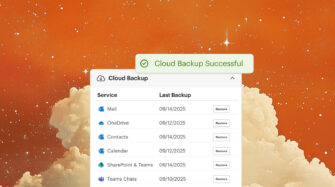SharePoint backup has become an essential part of modern MSP service delivery.
As clients depend on SharePoint for document libraries, project sites, and daily collaboration, MSPs need reliable ways to ensure that data is always recoverable and compliant. Native protections like recycle bins and short retention windows help, but they aren’t enough to cover the risks of accidental deletion, ransomware, or insider threats.
That’s why many providers turn to dedicated SharePoint backup solutions. The right platform not only protects data but also streamlines recovery, simplifies compliance, and reduces the operational overhead of managing multiple tenants.
In this guide, we’ll compare the best SharePoint backup options for MSPs and show how Syncro Cloud Backup unifies Microsoft 365 protection — including Exchange, OneDrive, Teams, and Entra ID — into a single, easy-to-manage platform.
Key Takeaways
- SharePoint backup is essential for MSPs who need to protect client collaboration data beyond Microsoft’s limited native retention.
- The best solutions balance coverage for sites, libraries, and files with fast restore options and flexible retention policies.
- Pricing models and multi-tenant management matter—look for predictable per-user costs and centralized dashboards to reduce overhead.
- Many providers bundle SharePoint backup with Microsoft 365 coverage, protecting Exchange, OneDrive, Teams, and Entra ID in one solution.
- Syncro Cloud Backup stands out by combining Microsoft 365 and Entra ID protection with automated billing, reporting, and management inside a single MSP platform.
A proactive approach to SharePoint backup and Microsoft 365 data protection
Relying solely on Microsoft’s native tools can leave MSPs exposed to data loss and compliance risks. While features like recycle bins and retention policies provide a basic safety net, they don’t deliver the long-term, multi-tenant protection that service providers need. A proactive approach to SharePoint backup ensures that client data remains secure, recoverable, and compliant — even in the face of accidental deletion, ransomware, or insider threats.
A modern SharePoint backup strategy should include:
- Comprehensive coverage: Protect not only SharePoint sites and libraries, but also Exchange mailboxes, OneDrive files, Teams conversations, and Entra ID identity data.
- Granular recovery options: Restore a single file, a full site collection, or entire tenant data sets, depending on client needs.
- Compliance and retention management: Enforce long-term retention policies and generate audit-ready reports to meet regulatory requirements.
- Multi-tenant administration: Manage all clients through a single console with role-based access, per-tenant reporting, and clear visibility across environments.
- Predictable pricing: Flat per-user or per-endpoint pricing eliminates surprises and simplifies client billing.
- Automation and integrations: Leverage APIs and webhooks to connect backup workflows with ticketing, reporting, and billing systems.
By adopting this proactive mindset, MSPs can move beyond basic recovery tools and offer a true managed data protection service. That not only reduces operational risk but also creates a stronger foundation for scaling Microsoft 365 services profitably.
SharePoint backup alternatives for MSPs
Choosing the right SharePoint backup alternative is a top priority for MSPs managing Microsoft 365 environments.
While Microsoft provides native retention tools, they aren’t designed to handle long-term data protection, multi-tenant management, or compliance reporting at scale. That’s why many service providers evaluate third-party solutions that deliver faster restores, predictable pricing, and MSP-ready dashboards.
In this section, we compare leading SharePoint backup alternatives — Redstor, Dropsuite, CloudAlly, SpinOne, AvePoint, MSP360, Catalogic DPX, and Syncro Cloud Backup. Each offers unique strengths, from compliance archiving to cloud-native scalability, but not every option aligns with MSP workflows.
Understanding how these tools differ will help you find the best fit for protecting SharePoint sites, libraries, and metadata while meeting client expectations for reliability and value.
Syncro Cloud Backup: Best for MSPs protecting Microsoft 365 and Entra ID
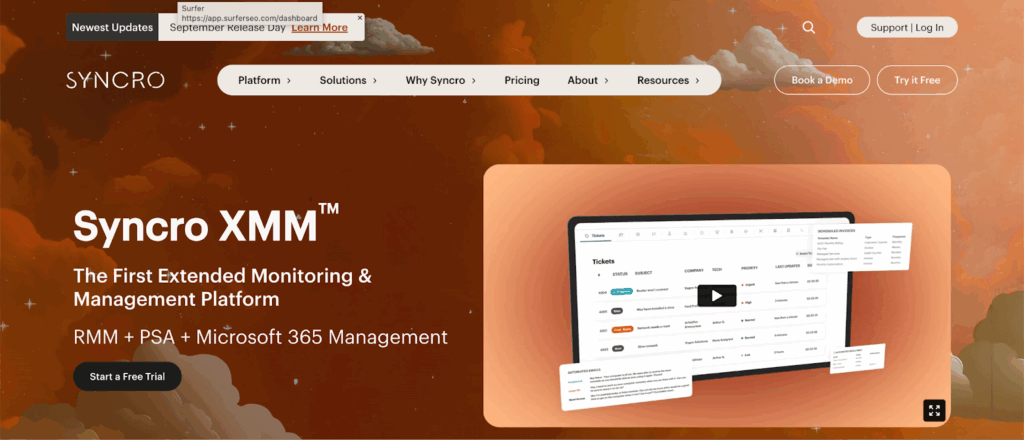
Overview
Syncro Cloud Backup brings SharePoint protection directly into the Syncro XMM platform, giving MSPs an integrated way to safeguard Microsoft 365 workloads. It covers SharePoint sites and libraries alongside Exchange, OneDrive, Teams, OneNote, Planner, and Entra ID objects. With automated billing, unlimited storage, and fast restores, it’s designed for MSPs who want to simplify operations while protecting client collaboration data.
Pros
- Flat per-user pricing: Predictable monthly fee with unlimited storage under fair use.
- Full Microsoft 365 coverage: SharePoint, Exchange, OneDrive, Teams, and Entra ID.
- Fast, flexible restores: Recover files, libraries, or sites in minutes.
- Automated billing: Charges flow directly into recurring invoices.
- Multi-tenant ready: Central console designed for MSP client management.
- Ease of use: Built directly into Syncro, reducing tool sprawl.
Cons
- Focused scope: Optimized for Microsoft 365 and Entra ID, not servers or VMs.
- Newer entrant: Less legacy recognition compared to long-established vendors.
Redstor: Best for instant recovery across Microsoft 365

Overview
Redstor is a cloud-native Microsoft 365 backup solution designed for MSPs that want fast, elastic recovery across multiple tenants. It automatically discovers SharePoint environments and applies policies to protect sites, document libraries, and files. Redstor also extends coverage to Exchange, OneDrive, and Teams, offering unified Microsoft 365 protection.
Pros
- Instant recovery: Access data immediately while full restores continue in the background.
- Unlimited retention: Long-term data availability without hidden costs.
- Multi-tenant console: Manage all clients in one centralized dashboard.
- Cloud-native scalability: No appliances or local infrastructure required.
Cons
- Pricing complexity: May be costlier for smaller MSPs with fewer seats.
- Learning curve: Interface and policy design may require training.
G2 score: 4.6
Dropsuite: Best for compliance-driven SharePoint backup
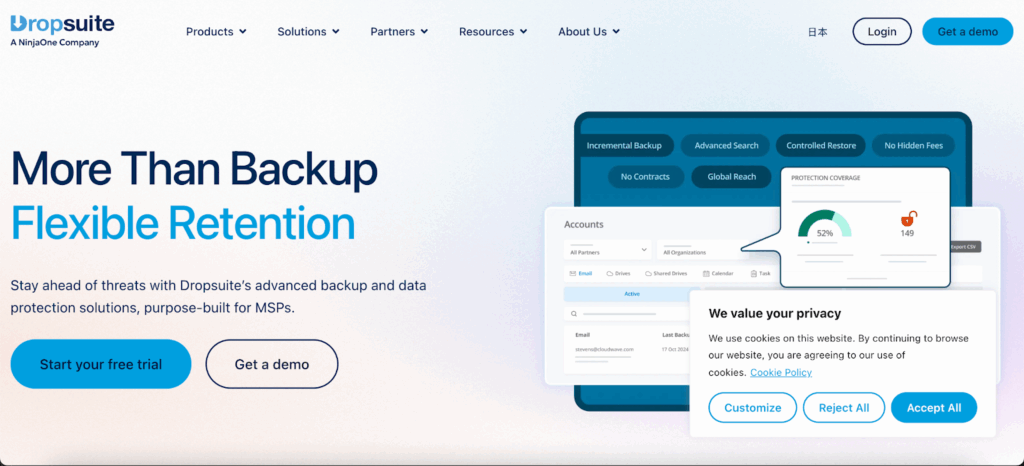
Overview
Dropsuite is known for combining Microsoft 365 backup with compliance archiving, making it appealing to MSPs working with regulated industries. It backs up SharePoint sites and libraries alongside Exchange, OneDrive, and Teams, while also providing audit-ready journaling and export tools for compliance reviews.
Pros
- Flat per-user pricing: Predictable billing for MSPs.
- Audit trails: Built-in reporting supports compliance mandates.
- Point-in-time restores: Quickly roll back to a known good version.
- Archiving integration: Goes beyond backup with long-term storage.
Cons
- Less granular recovery: Limited flexibility compared to some cloud-native tools.
- UI simplicity: Lacks advanced MSP-focused dashboards.
G2 score: 4.4
CloudAlly: Best for simplicity and fast deployment
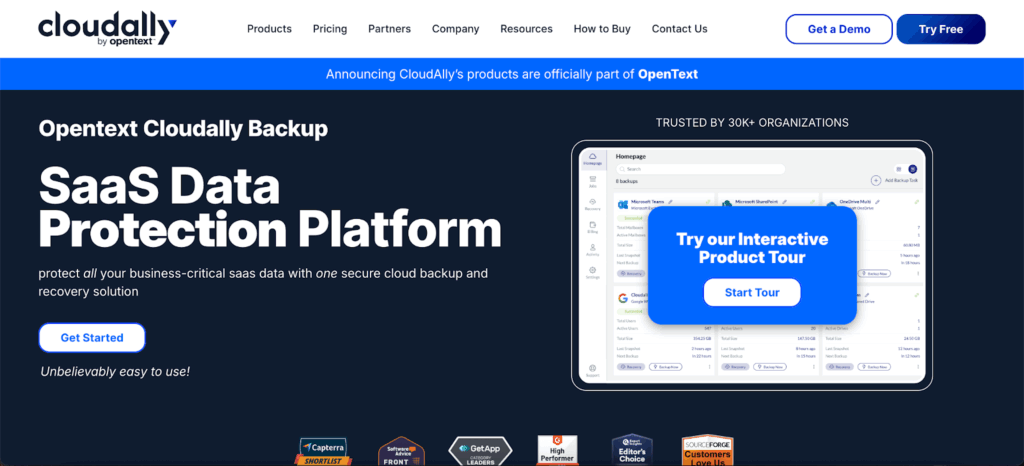
Overview
CloudAlly delivers lightweight, easy-to-deploy Microsoft 365 backup options. The technology focuses on core coverage for SharePoint, OneDrive, Exchange, and Teams, with an emphasis on simplicity for MSPs that want to get started quickly. Both platforms provide granular recovery, though they may lack some of the multi-tenant depth larger MSPs require.
Pros
- Ease of setup: Quick onboarding with minimal configuration.
- Granular restores: Recover individual files or libraries with ease.
- Cloud-native design: Fully SaaS-based, no hardware required.
- Affordable tiers: Competitive pricing for smaller MSPs.
Cons
- Limited MSP tools: Less robust for managing many tenants.
- Fewer integrations: Limited PSA/RMM and billing automation.
G2 score: 4.5
AvePoint: Best for enterprise-grade SharePoint backup
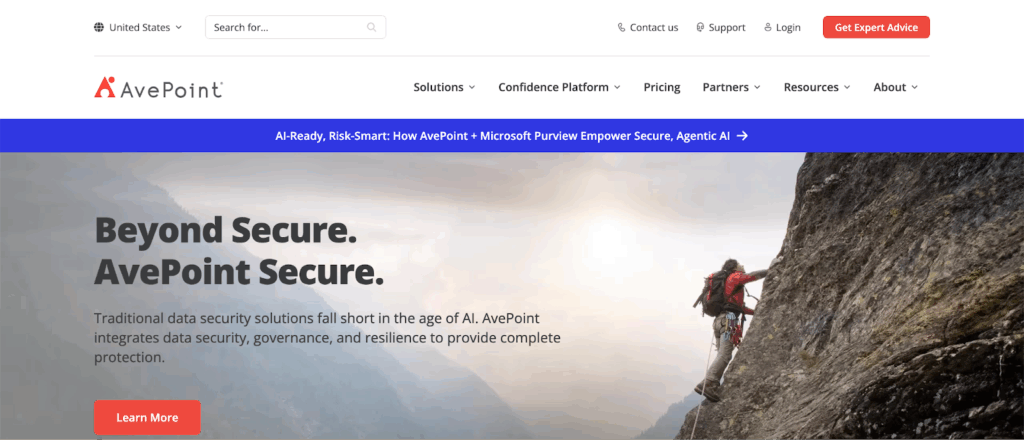
Overview
AvePoint has long specialized in SharePoint backup and migration, giving it deep expertise in protecting complex site collections, metadata, and permissions. It offers robust compliance features, policy-driven automation, and reporting that appeals to enterprises and MSPs supporting regulated industries.
Pros
- Granular SharePoint coverage: Protects sites, subsites, lists, libraries, and metadata.
- Compliance strength: Built-in reporting and eDiscovery support.
- Hybrid flexibility: Works across on-premises and cloud environments.
- Automation tools: Policy-driven management scales well across clients.
Cons
- Higher cost: Pricing is often enterprise-focused.
- Complex deployment: Longer onboarding for MSPs compared to simpler SaaS-native platforms.
G2 score: 4.3
MSP360: Best for flexible storage and cost-sensitive MSPs
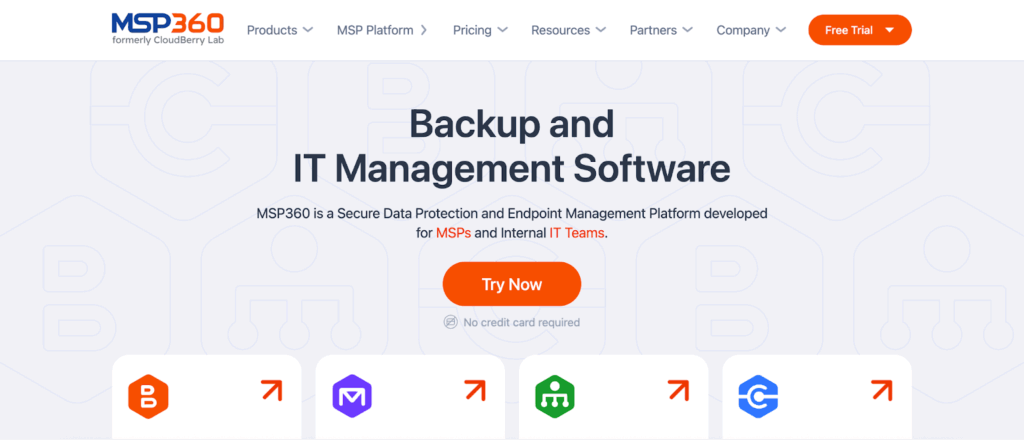
Overview
MSP360 (formerly CloudBerry) offers SharePoint and Microsoft 365 backup with a storage-agnostic model. MSPs can use their preferred cloud storage providers (Azure, AWS, Wasabi, etc.) and white-label the service to build their own brand. Its cost predictability and flexibility make it appealing to smaller or budget-conscious providers.
Pros
- Predictable pricing: Straightforward per-endpoint billing.
- Storage flexibility: Works with multiple cloud or on-premises storage providers.
- White-labeling: MSPs can rebrand the solution for their own services.
- Lightweight deployment: Easy to roll out for smaller clients.
Cons
- Limited enterprise features: Not as strong for compliance-heavy clients.
- Manual orchestration: Requires more hands-on work at scale.
- SaaS coverage gaps: Not as deep as competitors like Druva or Redstor.
G2 score: 4.4
Catalogic DPX: Best for heterogeneous enterprise environments
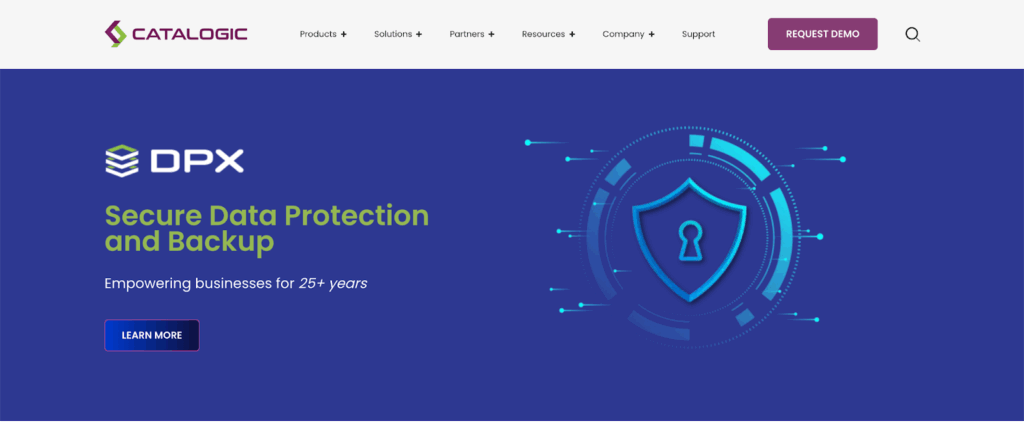
Overview
Catalogic DPX is an enterprise-class data protection platform that includes SharePoint backup as part of its broader coverage. It is designed for MSPs and enterprises that need to protect mixed workloads, from VMs and servers to Microsoft 365. Its strength lies in disaster recovery and policy-driven automation across complex environments.
Pros
- Broad workload support: Protects SharePoint, VMs, databases, and servers.
- Disaster recovery features: Built-in replication and failover tools.
- Policy-based automation: Scales across large client environments.
- Enterprise reporting: Deep compliance and governance support.
Cons
- Enterprise-oriented: Overkill for smaller MSPs.
- Complex interface: Steeper learning curve for teams new to the platform.
- Costly licensing: Pricing is geared toward large deployments.
G2 score: 4.2
Comparison table: Best SharePoint backup solutions for MSPs
| Vendor | Best fit | Pros (highlights) | Cons (highlights) | G2 score |
| Syncro Cloud Backup | MSPs focused on Microsoft 365 + Entra ID | Flat pricing, full M365 coverage, automated billing, ease of use | Narrower scope, newer entrant | 4.6 |
| Redstor | MSPs needing instant recovery | Instant recovery, unlimited retention, multi-tenant console | Pricing complexity, learning curve | 4.6 |
| Dropsuite | Compliance-focused MSPs | Flat pricing, audit trails, point-in-time restores | Less granular recovery, limited MSP dashboards | 4.4 |
| CloudAlly / SpinOne | Smaller MSPs needing fast deployment | Easy setup, granular restores, SaaS-native design | Limited MSP tools, fewer integrations | 4.5 |
| AvePoint | Enterprise/regulatory MSPs | Granular SharePoint coverage, compliance, hybrid support | Higher cost, complex deployment | 4.3 |
| MSP360 | Cost-sensitive MSPs needing flexibility | Predictable pricing, storage choice, white-labeling | Limited enterprise features, SaaS coverage gaps | 4.4 |
| Catalogic DPX | Enterprise-heavy MSPs | Broad workload support, disaster recovery, enterprise reporting | Overkill for SMBs, complex, costly | 4.2 |
Finding the right SharePoint backup for MSPs
SharePoint backup solutions must always align with your MSP’s broader goals. Recovery reliability, pricing transparency, SaaS coverage, and multi-tenant management all shape the value you can deliver to clients.
Legacy tools or migration utilities may cover the basics, but MSPs often need more: automated billing, unified dashboards, and backup that extends across Microsoft 365. That’s where Syncro Cloud Backup stands out. By combining SharePoint protection with Exchange, OneDrive, Teams, and Entra ID, Syncro gives MSPs a complete, SaaS-first solution inside a single platform.
Ready to reduce tool sprawl, improve recovery confidence, and capture predictable revenue?
Request a demo or start your free trial and see how Syncro Cloud Backup simplifies Microsoft 365 protection.
Frequently Asked Questions
Microsoft operates on a shared responsibility model. While it ensures infrastructure uptime, data protection is the MSP’s responsibility. Native tools like recycle bins and retention policies are limited, leaving gaps that can lead to permanent data loss. Third-party SharePoint backup ensures long-term retention, faster recovery, and compliance readiness.
The best SharePoint backup depends on your client base. Redstor and Druva lead with cloud-native performance, Dropsuite appeals to compliance-driven MSPs, MSP360 fits cost-sensitive providers, and Syncro Cloud Backup offers a unified Microsoft 365 solution with built-in billing and predictable pricing.
Most modern solutions protect more than just SharePoint. Syncro Cloud Backup, for example, includes Exchange, OneDrive, Teams, OneNote, Planner, and Entra ID. This gives MSPs full coverage for Microsoft 365 environments from one console.
Pricing varies. Some vendors bill by storage or modules, while MSP360 uses a per-endpoint model. Syncro Cloud Backup offers flat per-user pricing with unlimited storage, making costs predictable and easier to pass through to clients.
Speed depends on the platform. Cloud-native solutions, such as Redstor and Syncro Cloud Backup, provide rapid, granular restores—whether you need a single file, a full library, or an entire site—minimizing downtime for end-users.
Most providers use secure cloud infrastructure, often with regional options. Syncro Cloud Backup lets MSPs select Microsoft Azure regions in the U.S. or Canada, supporting compliance with data residency requirements.
MSPs should look for multi-tenant consoles with role-based access, per-client reporting, and automated billing. Syncro Cloud Backup is purpose-built for this model, helping providers reduce overhead while scaling services.
Share












